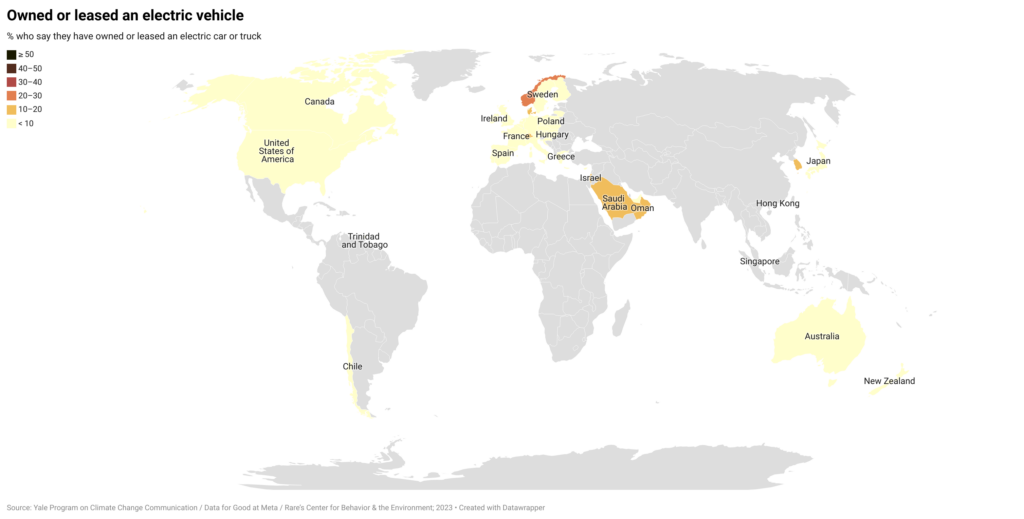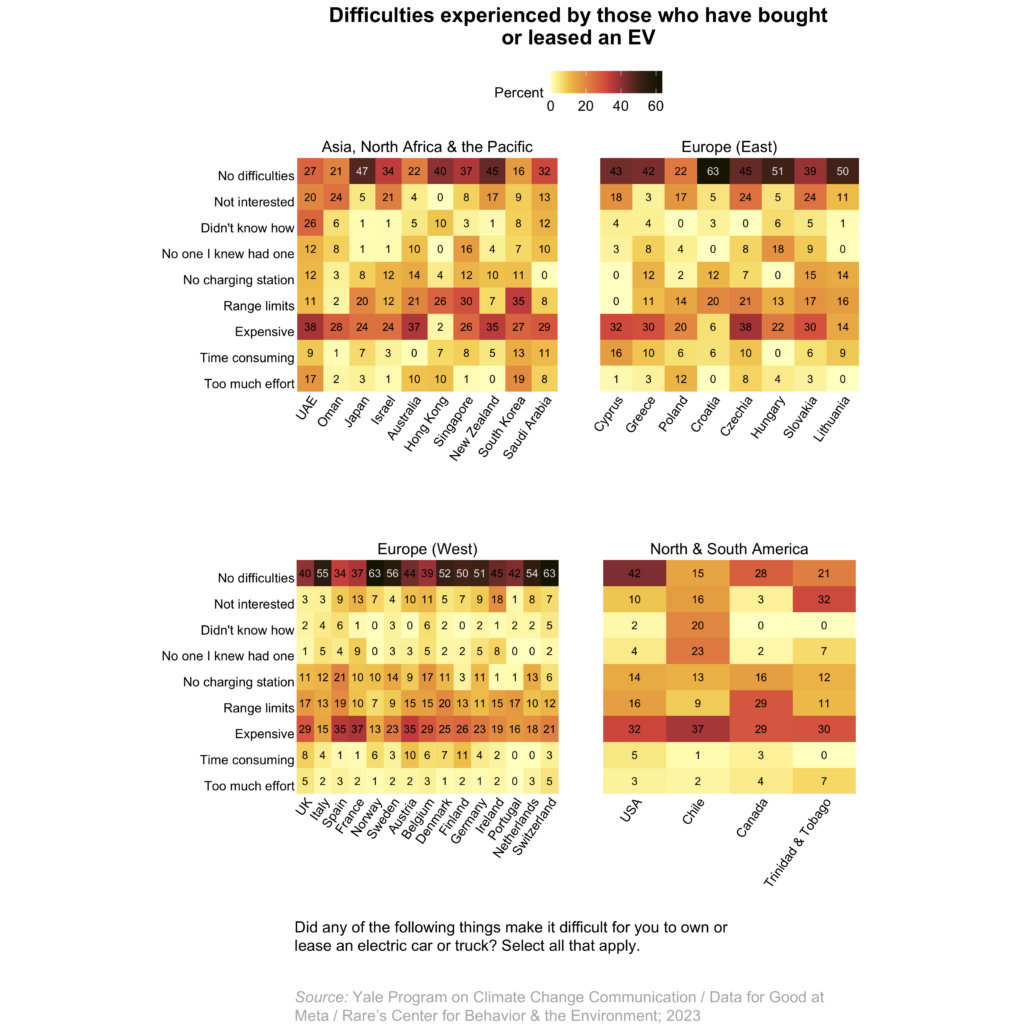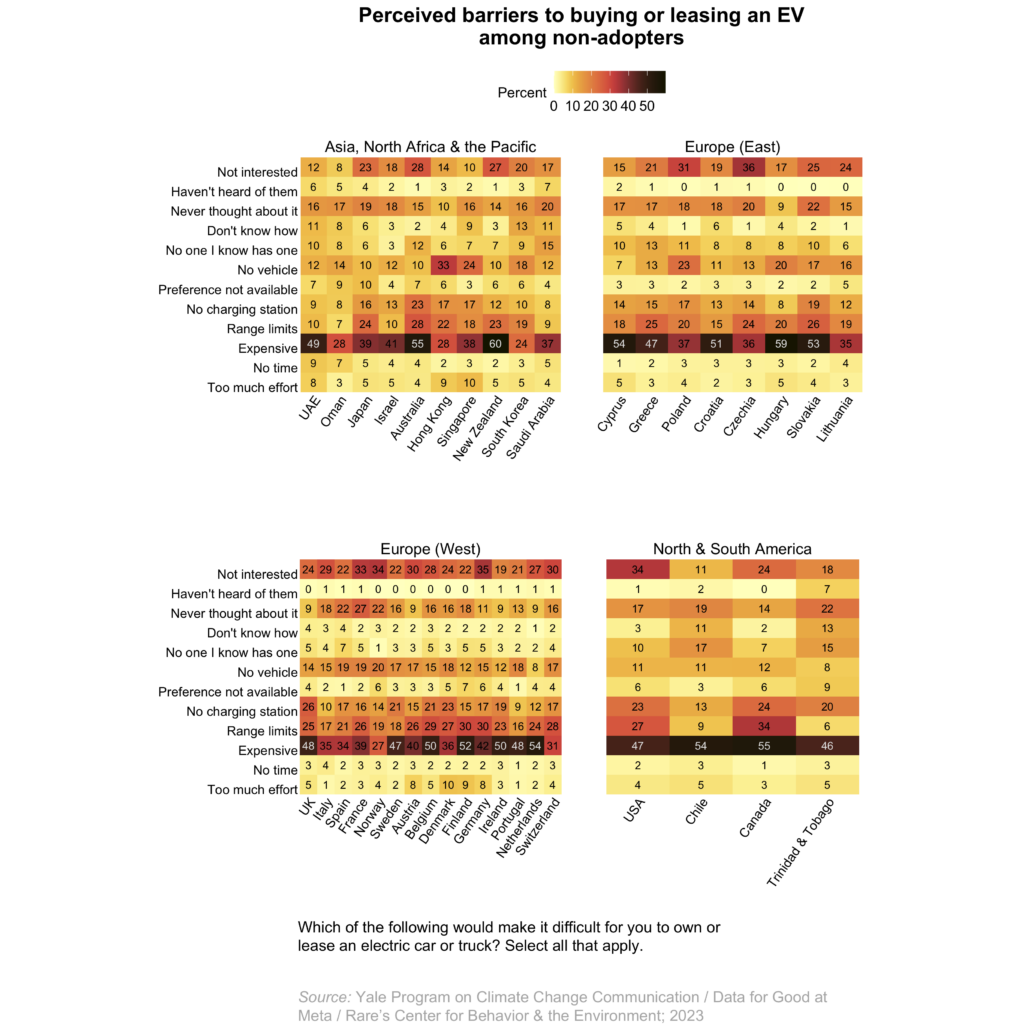Report · Jun 6, 2024
International Public Opinion on Climate Change: Household Climate Actions – Adoption and Barriers, 2023
By Anthony Leiserowitz, Jennifer Carman, Emily Goddard, Erik Thulin, Emily Wood, Marija Verner, Natalia Ordaz Reynoso, Seth Rosenthal, Jennifer Marlon and Nicole Buttermore
Filed under: Behaviors & Actions and Beliefs & Attitudes
7. Electric Vehicles
7.1. Few respondents overall said they have owned or leased an electric car or truck.
Few respondents across all surveyed countries and territories (7%, see section 1.1) said they had owned or leased an electric car or truck. Respondents in Norway (25%) and Denmark (12%) were the most likely to say so, while respondents in Czechia and Poland (both 3%) were the least likely to say so.
7.2. Many respondents who had owned or leased an electric vehicle said they faced no difficulties doing so.
Among respondents who said they had owned or leased an electric car or truck, majorities in 11 out of 37 surveyed countries and territories said they did not have any difficulties doing so. Respondents in Europe were most likely to say they had not had difficulties, with large majorities saying so in Croatia, Switzerland, and Norway (all 63%). Respondents who owned or leased an electric vehicle were least likely to say they did not face difficulties in Oman and Trinidad & Tobago (both 21%), South Korea (16%), and Chile (15%), meaning that they were most likely to say they faced some difficulties.
However, other respondents who had adopted this behavior did report facing some difficulties. The United Arab Emirates (38%), Czechia (38%), and Chile (37%) had the largest percentages of respondents who said it was expensive.Respondents were allowed to select more than one answer to this question, unless they selected “I didn’t have any difficulties.” Trinidad & Tobago (32%), and Czechia, Slovakia, and Oman (all 24%) had the largest percentages who said they were not interested. South Korea (35%), Singapore (30%), and Canada (29%) had the largest percentages who said they thought electric cars or trucks could not travel far enough without having to recharge. Spain (21%), Belgium (17%), and Canada (16%) had the largest percentages who said they did not have access to a charging station. The United Arab Emirates (26%), Chile (20%), and Saudi Arabia (12%) had the largest percentages who said they did not know how to own or lease an electric car or truck. Chile (23%), Hungary (18%), and Singapore (16%) had the largest percentages of respondents who said no one they knew had an electric car or truck. South Korea (19%), the United Arab Emirates (17%), and Poland (12%) had the largest percentages who said they thought it would take too much effort. Finally, Cyprus (16%), South Korea (13%), and Saudi Arabia and Finland (both 11%) had the highest percentages who said it took a lot of time.
7.3. Among those who had not owned or leased an electric vehicle, the most common barriers were expense, not being interested, or not being able to travel far enough without recharging.
Among those who said they had not owned or leased an electric car or truck, the most common reasons it would be difficult to do so (i.e., “barriers”) were that it is too expensive, electric cars or trucks cannot travel far enough without having to recharge, or they are not interested in doing so.Respondents were allowed to select more than one answer to this question.
Respondents in Hungary (59%), and Canada and Australia (both 55%) said it is too expensive, and majorities gave this response in 12 of the 37 countries and territories surveyed. Czechia (36%), Germany (35%), and Norway and the United States (both 34%) had the highest percentages of respondents who said they are not interested in doing this. Canada (34%), and Finland and Germany (both 30%) had the highest percentages who said that electric cars or trucks cannot travel far enough without having to recharge.
Among other barriers to electric vehicle adoption, Hong Kong (33%), Singapore (24%), and Poland (23%) had the highest percentages of respondents who said that they do not need a vehicle. The United Kingdom (26%), Canada (24%), and Denmark, New Zealand, and the United States (all 23%) had the highest percentages who said that they do not have access to a charging station. France (27%), followed by Norway, Slovakia, Spain, and Trinidad & Tobago (all 22%) had the highest percentages who said they had never thought about getting an electric car or truck. Chile (17%), and Saudi Arabia and Trinidad & Tobago (both 15%) had the highest percentages who said no one they know has an electric car or truck. South Korea and Trinidad & Tobago (both 13%), followed by Saudi Arabia (11%), had the highest percentages who said they do not know how to own or lease an electric car or truck. Singapore and Denmark (both 10%) had the highest percentages of respondents who said that it is too much effort to do so. Japan (10%), and Oman and Trinidad & Tobago (both 9%) had the largest percentages who said the type of car or truck they want is not available. The United Arab Emirates (9%) and Oman (7%) had the highest percentages who said they did not have the time. Finally, Trinidad & Tobago and Saudi Arabia (both 7%), and the United Arab Emirates (6%) had the highest percentages who said they had never heard of electric cars or trucks.


